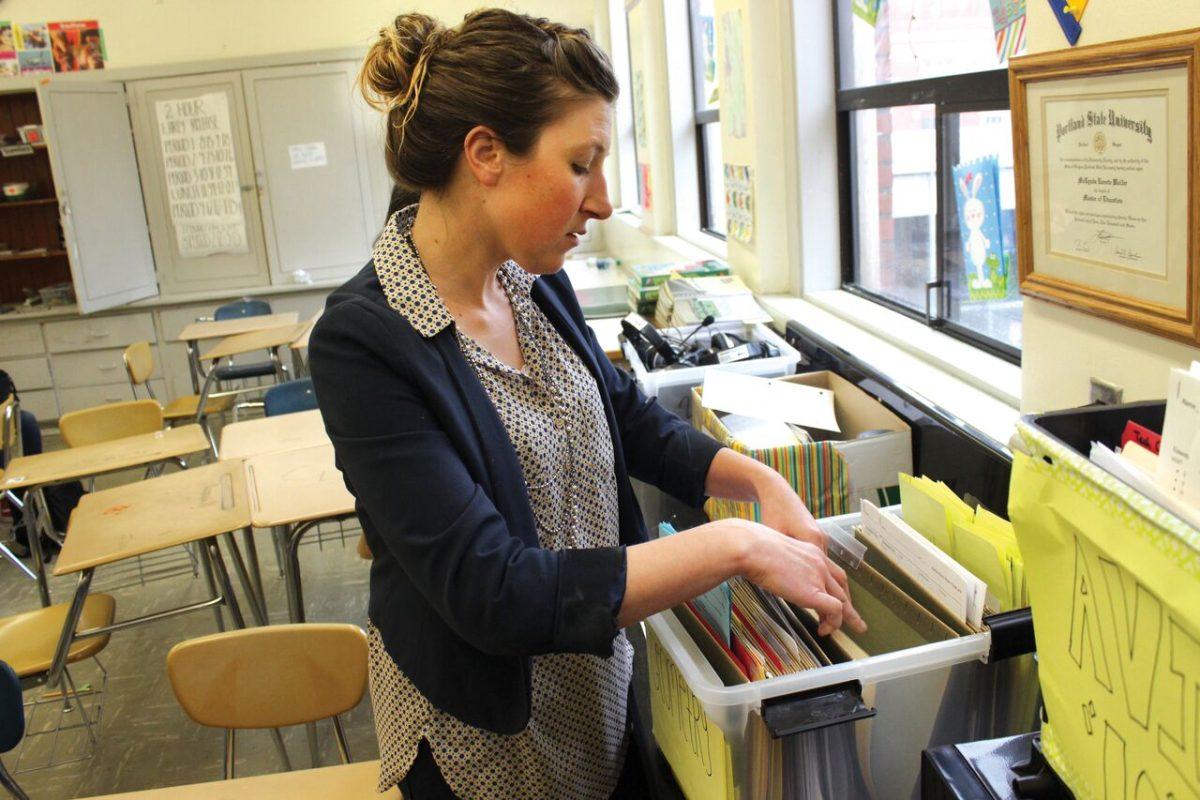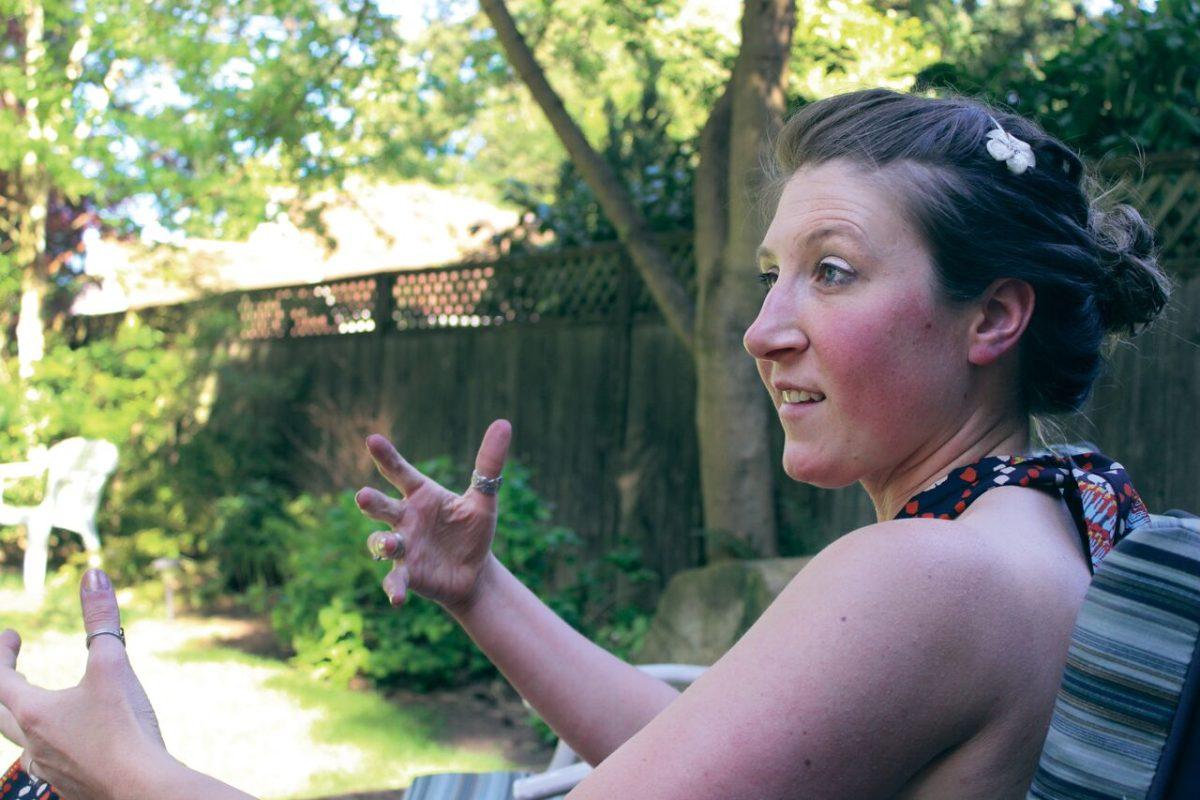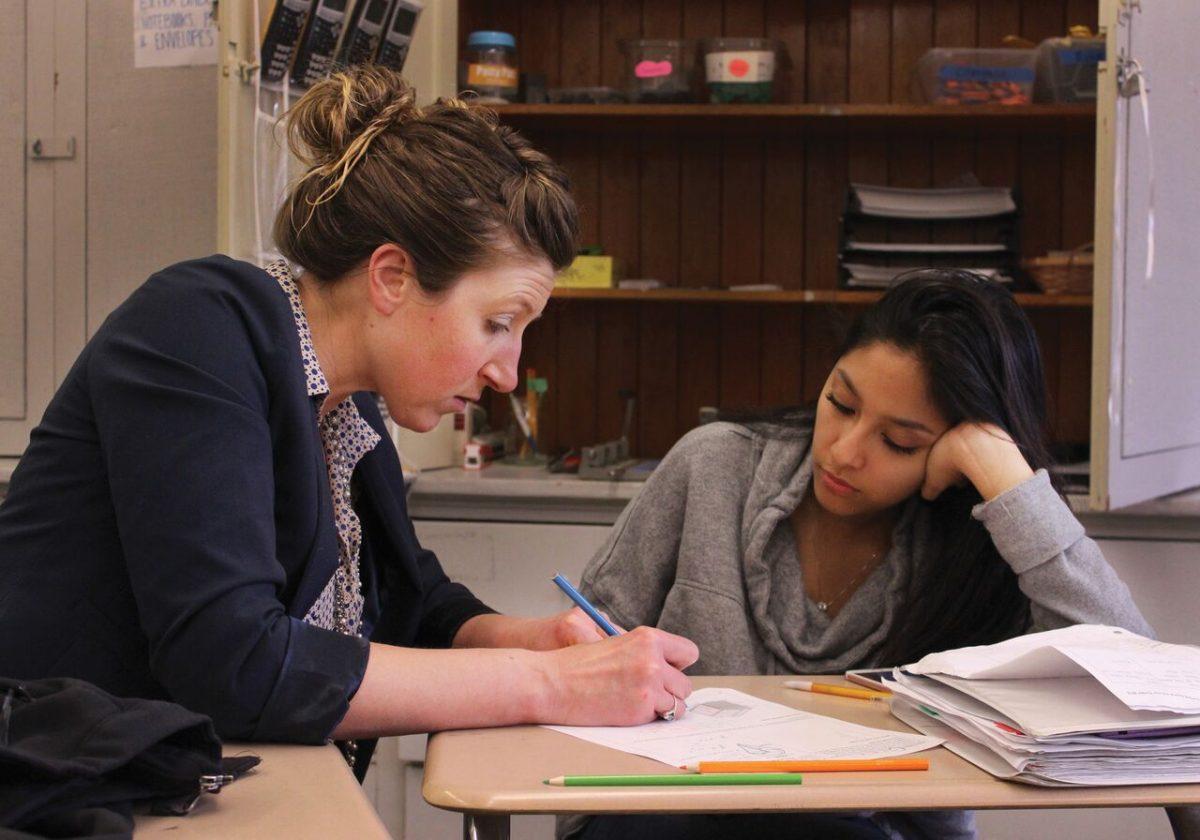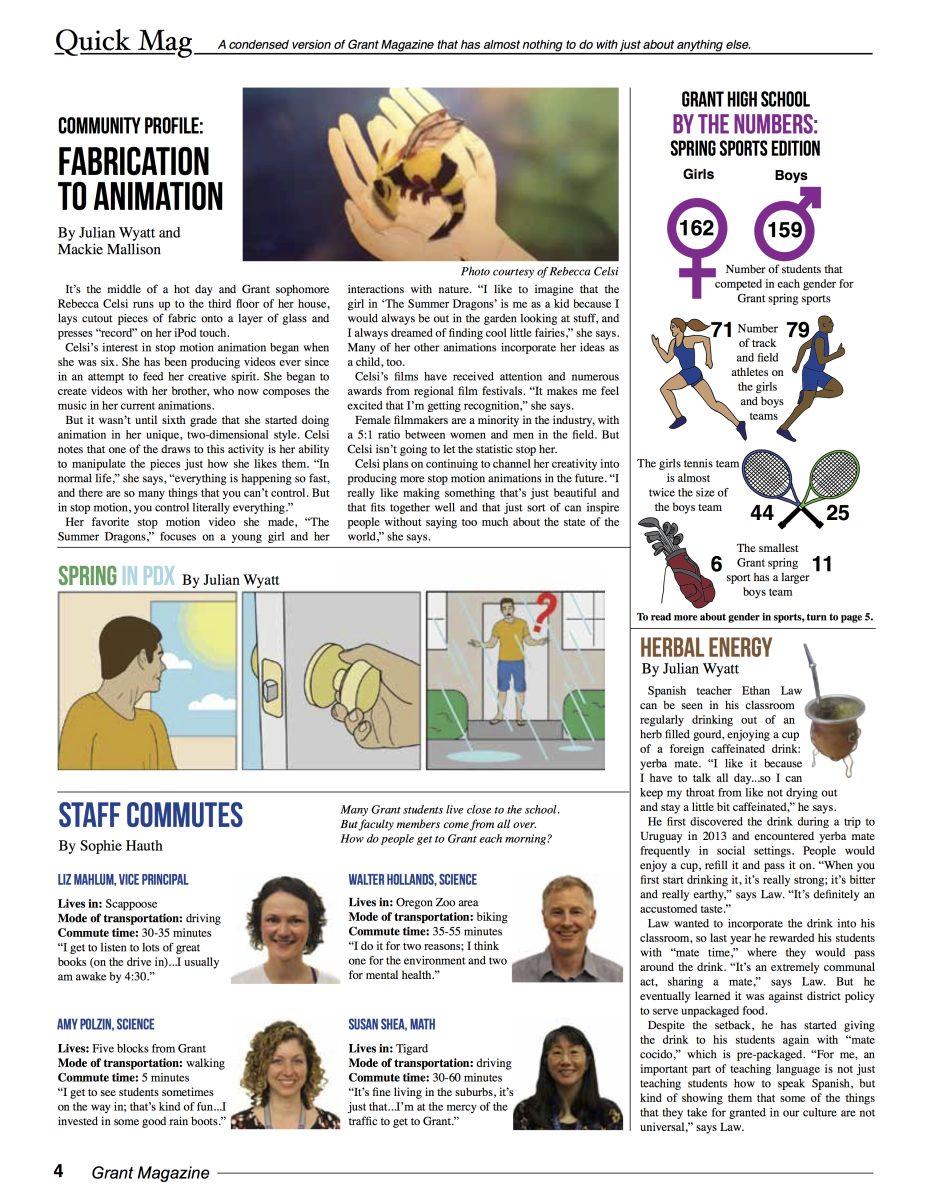
It’s a Thursday flex period at Grant High School, and MaLynda Wolfer sits in her classroom at her computer, trying to choose a music station on Pandora. She decides on Beyoncé. A geometry student struggles on a worksheet nearby, and Wolfer immediately goes to his desk.
They talk about how to solve a few problems, but Wolfer never gives him the final answers. Instead, she asks him questions to help him understand the process behind it. “You can solve it from here,” she says, jokingly. “If you can’t, then I have failed you.”
Wolfer’s path to becoming a math teacher hasn’t been smooth. She grew up in a low-income family and struggled with being the main caregiver to her four younger siblings. As a teenager, she fell into the wrong crowd and spent a lot of time partying. Eventually, she dropped out of high school and moved out of her home.
“The grit of my upbringing made me rough around the edges,” the 35-year-old Wolfer says now. “When my students struggle with math, I understand why. When my students struggle with issues at home, I also understand why. When my students struggle with the trials and tribulations that often accompany youth, I understand why.”
Wolfer, though, never let her circumstances define her. She made the decision to take a different path, working hard to become the first person in her family to graduate from college. And she’s never stopped challenging herself, especially in mathematics.
“I’ve always been very… motivated and determined,” she says. “And that’s why I like math, because math says to me all the time, ‘You can stop,’ like I’m really bad at it. And it always says, ‘This is really hard for you you’re never gonna get it.’ And then I try even harder so that I do get it.”
Born on Aug. 27, 1980, Wolfer grew up in Salem, the oldest of five kids. Her father worked graveyard shifts at a cannery, and her mother was a homemaker. The family struggled to make ends meet, living in public housing and moving around a lot. Wolfer remembers attending 14 different schools before she reached high school.
Her sister, Heather Gorman, says: “We kind of never knew where we were going to stay or what was going to happen next. It was kind of hard to throw down ties.”
But Wolfer says the distress in the background just seemed to make things seem normal.
“I didn’t identify that there was something different about my family,” she says. “I grew up low-income…so we lived in public housing right next to other people who were in public housing, and so you were always around that, so you don’t know that anything is different.”
“When my students struggle with the trials and tribulations that often accompany youth, I understand why”- MaLynda Wolfer
Wolfer’s mother struggled with bipolar disorder, a mental illness that caused her to have severe mood swings that would last several days, weeks or even months at a time.
“When my mom was in the right mood, it was like the best of the best,” Wolfer recalls. “You’d come home and there’d be like cookies that were made, and she would’ve like made you a sweatshirt with puff paint…and that would be on a really good day. And on a really bad day it would look so different.
“She would feign sickness. She’d be like, ‘Oh, I have a migraine. I can’t possibly get out of bed today.’ Tomorrow, the next day, three days later, you’re like, ‘What’s happening?’”
Wolfer remembers her mother’s mood would sometimes be so bad that she’d either be depressed or yelling at her children. Sometimes, she’d threaten suicide.
Gorman remembers just wanting things to turn out OK. “As a child, you want that nurturing mother. You want that mother who is gonna be there for you, who you can count on,” she says. “But it ended up being us more taking care of her than her taking care of us.”
Wolfer remembers making sure her siblings got up on time and had breakfast before taking them to school. “My students ask all the time: ‘Ms. Wolfer, when are you going to have kids?’” she says now. “And I’m like no, you don’t understand. I’ve had kids.”
She and Gorman remember struggling to find clothing. And not knowing what to expect from their mother made things harder.
Gorman says Wolfer did her best to make do. “Growing up with nothing and…not even having shoes to wear or having to wear like a garbage bag to school for a coat, you had to persevere through a lot of…really difficult situations,” Gorman says now. “MaLynda always put like her best foot forward even when other people would be completely embarrassed. (She) always did everything first…the bad stuff, too.”
Some of that bad stuff included struggling with an eating disorder after she started attending South Salem High School. With the added stress from home and her mother’s condition, Wolfer’s confidence levels plummeted, and she developed anorexia.
Although she cooked most meals for her family, she deprived herself of food and worked out incessantly.
“There were a lot of things that felt like chaos and challenge in my life going on around me,” she says. “So I thought that the one thing I could control was…my caloric intake or how much I exercised. You can just say, I’m gonna deny myself that because that’s the one thing I can control.”
“Growing up with nothing…you had to persevere through a lot of…really difficult situations”- Heather Gorman
She became so thin that her body couldn’t adequately regulate its temperature. “I had this full-on jacket on and I remember this boy saying, ‘What are you doing? It’s 80 degrees,’” Wolfer recalls. “I just thought internally that he had no idea what I was struggling with.”
The turning point came when Wolfer’s best friend confronted her saying that she didn’t know who Wolfer was anymore. Soon after, Wolfer started to meet with a counselor to learn about how she could deal with her disorder. But it has been a long process, one that she calls a “lifelong journey.”
She slowly began to regain her confidence and develop strong friendships. But her home life and parental support didn’t improve.
“I wish I could say that they cared, but they didn’t…You could go to school or not go to school, and they didn’t care,” she says of her parents. “You could drop out; you could stay out all night. We had no rules or boundaries.”
And so, after Wolfer’s junior year, she dropped out and got a job at a local sandwich shop. It wasn’t long before two of her co-workers, both in their 20s, started inviting her to the wild parties they threw.
She remembers once when she was 16 going to a party at the sandwich shop after hours. She recalls people – many in their 20s – dancing, raiding the refrigerator and doing illicit drugs.
“They were adults, but they probably took advantage of me being…young and inexperienced,” she says. “I got in a lot of places I legally shouldn’t have gotten into.”
Sometimes, she would stay overnight after parties. At one point, she went home, packed her things and moved in with her co-workers. She worked during the day and partied at night, sometimes driving up to Portland where her friends sneaked her into clubs.
Wolfer lived with her friends for several months before deciding to make a change in her lifestyle. “After a while, I started to see that…I didn’t want to be like them, going home at 25 and begging parents for money,” she recalls.
So when Wolfer’s family moved to Jefferson, a small town south of Salem, she moved back in with them and re-enrolled in high school to finish her senior year.
Going back to school was a rough transition. “I just had to work really hard; I had to take extra classes,” Wolfer says. “I took advanced algebra with my sister who was a freshman, and I was a senior…It was a humbling experience to have to work your way up again.”
But Wolfer didn’t give up and graduated later that year.
The summer after her senior year, she worked double shifts at Dairy Queen and K-Mart to raise money for college. Serving Blizzards, she met her future husband, Mario Randall.
“While getting to know her, I realized she was driven in a way that spoke to me,” Randall says. “As if there is nothing that will stand in (her) way from accomplishing (her) goals.”
Wolfer and Randall started dating, and together they moved to Eugene where they attended Lane Community College. “We rented this tiny 350 square foot cottage,” Wolfer remembers. “It doesn’t sound romantic; it totally was not romantic.”
She got an associate degree in general studies, and the couple moved to Portland and got married. She attended Portland State University and received a bachelor’s degree in mathematics. In doing so, she became the first person in her family to graduate from college. She later tacked on a master’s degree in education from PSU.

“My younger sister says I was born to do it,” Wolfer says. “She remembers when I set up the schoolroom in the garage when she was learning to read, and I taught her and her best friend Michelle from next door how to read all summer long.”
Wolfer’s first job was at Marshall High School, where she worked as an after school coordinator. While there, she took a group of students to Mt. Hood to learn how to snowboard. She had never been before, but when she and her husband hit the slopes for the first time, they were hooked.
It wasn’t long before the couple had season passes at the mountain.
Wolfer developed a deep passion for snowboarding, but it took its toll on her body. In one skiing accident, she broke her leg, in another, her back.
“For a couple years in a row, she seemed to be what we would call accident prone,” says Olivia Green, one of her former co-workers. “In other words, various times she would be injured and so…once she got well we would start jokingly saying we’re gonna predict when her next injury would be.”
In 2014, Wolfer was hired at Grant after science teacher Amy Lindahl told her about a job opening. “I was really happy when she got hired,” says Lindahl. “And I feel like it’s been really, really positive for our kids having her here.”
Today, Wolfer’s teaching schedule consists of geometry, PSU Statistics and AVID, a three-year program designed to give students the skills they need to succeed in life after high school.
“She’s always got really good energy,” says Makenzie Swan-Duffy, who is a sophomore in Wolfer’s AVID class. “She’s kinda bubbly and happy all the time. So that sort of makes everyone want to participate.”

Lindahl admires how Wolfer’s presence changes the dynamic in a classroom. “I love seeing her with students,” says Lindahl. “She has such good relationships with her students, and she can work wonders with kids that are… disengaged at school and can kind of pull them back in and feel happy to be in her class. She’s a real caregiver in ways that I am not as a teacher.”
Part of that comes from reflecting on her own experiences. After her parents split up, she stayed in touch with her dad but not with her mom.
“We don’t choose our parents,” Wolfer says. “But even after years of conflicting emotions, I can’t imagine being the person I am without their influence or lack thereof.”
Her students say they see a level of patience in her that they don’t see in other teachers.
“I don’t think I’ve ever once seen her get annoyed with a student,” says Kanaan Herron, a sophomore in Wolfer’s geometry class. “She always tries to make it seem like we can do something.”
Although Wolfer has a very clear teaching style, she doesn’t hide that she still has a hard time with math. “I think the benefit of me being a teacher who struggles with mathematics is that I try my very best to break things down,” she says. “I envy the math teachers in my department who wake up and just have all this information…(who) don’t have to struggle with it.”
Some would call what she does as a teacher admirable, but being praised for her work is the least of Wolfer’s concerns.
“I guess I’m not worried about leaving a legacy,” she says. “I don’t care about that. I just want to enjoy the journey with the people who I’m on this path with while I’m here. And those are my students.” ◊
Grant Magazine reporter Tess Waxman contributed to this report.


































